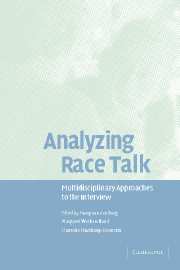Book contents
- Frontmatter
- Contents
- List of contributors
- Preface
- Acknowledgments
- Transcriptions symbols
- Introduction
- 1 Racism and the analysis of cultural resources in interviews
- 2 Analyzing racial discourse: the discursive psychology of mind–world relationships
- 3 Constructivist processes in discourse: a cognitive linguistics perspective
- 4 Institutional, professional, and lifeworld frames in interview talk
- 5 The uses of absurdity
- 6 Multiple voices in talking race: Pakeha reported speech in the discursive construction of the racial other
- 7 Contradictions in interview discourse
- 8 Racism, happiness, and ideology
- 9 The frame analysis of research interviews: social categorization and footing in interview discourse
- 10 Affiliation and detachment in interviewer answer receipts
- 11 Interviewer laughter as an unspecified request for clarification
- 12 Perspectives and frameworks in interviewers' queries
- Appendix: Interview transcripts
- Index
Introduction
Published online by Cambridge University Press: 22 September 2009
- Frontmatter
- Contents
- List of contributors
- Preface
- Acknowledgments
- Transcriptions symbols
- Introduction
- 1 Racism and the analysis of cultural resources in interviews
- 2 Analyzing racial discourse: the discursive psychology of mind–world relationships
- 3 Constructivist processes in discourse: a cognitive linguistics perspective
- 4 Institutional, professional, and lifeworld frames in interview talk
- 5 The uses of absurdity
- 6 Multiple voices in talking race: Pakeha reported speech in the discursive construction of the racial other
- 7 Contradictions in interview discourse
- 8 Racism, happiness, and ideology
- 9 The frame analysis of research interviews: social categorization and footing in interview discourse
- 10 Affiliation and detachment in interviewer answer receipts
- 11 Interviewer laughter as an unspecified request for clarification
- 12 Perspectives and frameworks in interviewers' queries
- Appendix: Interview transcripts
- Index
Summary
Discourse analysis is a rapidly expanding field of research and theorizing. The growing interest in this field of research reflects a threefold linguistic turn in the social sciences. First, there has been a developing appreciation among social scientists of the central role of discursive practices in social life. The conception of language as a mere technical means of communication has been superseded. Language has been re-conceptualized as social activity. As a consequence, the traditional boundaries between linguistics and the social sciences have become blurred. To fully understand contemporary social life, researchers have had to turn their attention to a diverse range of new phenomena. These include, for instance, the large-scale discursive practices that make up postmodern reflexive culture and the small-scale organization of talk in the call centers of the new service economies, the formulation of social policy and the detail of social interaction. The study of discourse is inseparable from the study of society.
Second and more generally, the concept of discourse has produced new and fruitful angles on the old themes of the social sciences such as the nature of power and the construction of social identities. Many recent theoretical debates and controversies within the social sciences are concerned with the way the notion of discourse is used, and its potentialities and limits. Third, there has been a growing recognition that social research is itself a discursive practice. Scientists' discourse emerged as a research topic for discourse analysts at the beginning of the 1980s.
- Type
- Chapter
- Information
- Analyzing Race TalkMultidisciplinary Perspectives on the Research Interview, pp. 1 - 10Publisher: Cambridge University PressPrint publication year: 2004



